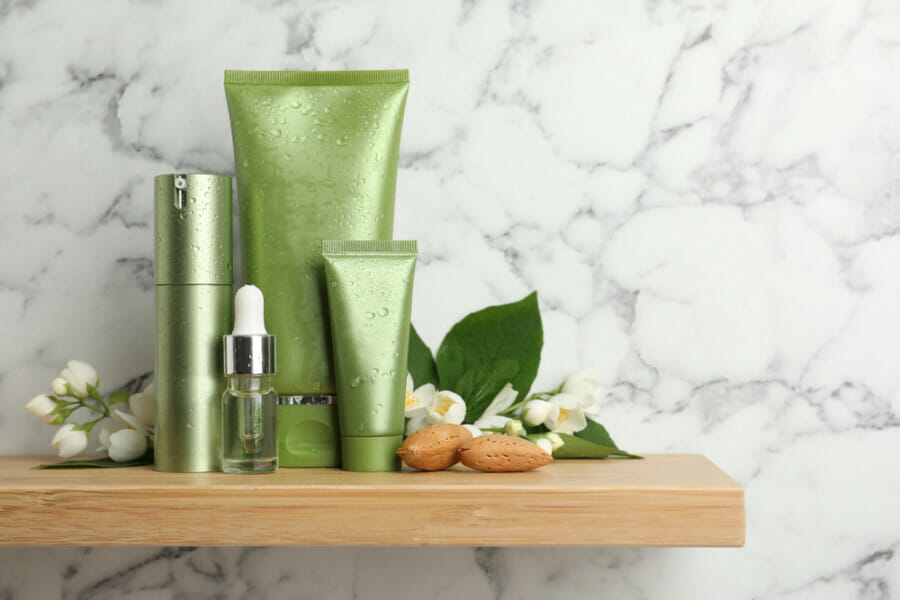Image Source: New Africa / Shutterstock

9 Controversial Ingredients To Avoid in Personal Care Products
The EU has banned (or restricted) 1,300 ingredients in personal care products compared to the US which has only banned (or restricted) 11, as reported by The Guardian.
How can one group find certain ingredients so harmful…
IT’S ASTOUNDING!
I’m Vani Hari, a co-founder of Truvani. Over the past decade, I have advocated for Ingredient Transparency in our food and various daily items (including personal care products).
Despite significant strides, major corporations are slow to adapt.
I believe we should be able to have products made without certain harmful ingredients.
Isn’t that a reasonable expectation?
Apparently, it seems like it’s a distant reality.
Therefore, I took matters into my hands.
I launched Truvani with a primary objective: eliminate harmful ingredients from all everyday products.
We began with supplements and have now expanded to include personal care products.
Here Are 9 Controversial Ingredients I Never Want To See In My Personal Care Products
#1. NO ALUMINIUM
Have you ever checked the ingredient list on a conventional deodorant or antiperspirant?
Numerous companies use aluminum in antiperspirants, which poses a concern.
Antiperspirants are designated as over-the-counter drugs that block sweat glands to prevent sweating, achieved through the use of an aluminum compound.
Why is this concerning?
Our bodies sweat for a purpose. Why inhibit its natural function?
Despite being labeled as “generally safe,” the controversy surrounding aluminum in antiperspirants prompted me to switch to aluminum-free organic deodorants.
#2. NO CARRAGEENAN
Carrageenan is present in many milk substitutes, infant formulas, deli meats, cottage cheese, and even personal care products.
Despite potential USDA certification and appearance in organic products, the controversy surrounding carrageenan is worrisome.
Some scientists contend it’s a carcinogen, while others believe it is safe. After reviewing research by the Cornucopia Institute, I decided not to take the risk.
The Institute detailed the timeline, lack of regulation, and questionable practices leading to the approval of carrageenan in organic products.
Its controversies concerning almond milk should also be applied to toothpaste. Therefore, I avoid it in personal care products.
#3. NO PARABENS
Parabens are commonly used preservatives in cosmetics and certain personal care products. They are also occasionally found in labeled “Fragrances.”
On ingredient lists, they may appear as Propylparaben, Isopropylparaben, Butylparaben, or Isobutylparaben.
I steer clear of them whenever feasible.
While some scientists argue for their safety, others raise concerns about their potential dangers, leading to significant controversy.
#4. NO FRAGRANCES (PARFUM)
When you encounter “Parfum” or “Fragrance” on an ingredient label, it is advisable to proceed with caution.
Fragrances are complex blends of various chemicals and ingredients for which companies do not need to disclose details due to patent protection.
I believe it’s essential to know the contents of products we use; hence, I consistently avoid these ingredients.
(The same principle applies to Natural Flavors or flavoring. If companies don’t disclose their flavor ingredients, I also avoid such products.)
#5. NO SULFATES (SLS or SLES)
Ever wondered why some personal care products lather up? It’s because some companies incorporate Sodium Laureth Sulfates (SLES).
Depending on production methods, this ingredient may be contaminated with ethylene oxide, contributing to its controversy, which is why I exclude it from my personal care items.
#6. NO FORMALDEHYDE-RELEASING PRESERVATIVES
Certain cosmetics and personal care products contain formaldehyde-releasing preservatives, which I prefer to steer clear of.
These preservatives are controversial as they gradually release formaldehyde in small amounts, prompting my decision to avoid them due to my concern for our body’s wellbeing.
#7. NO DEA-related Ingredients
DEA (diethanolamine) and related compounds are present in some cosmetic and personal care items, often used to modify texture and act as a pH adjustor.
Although found in products like moisturizers, sunscreens, soaps, and shampoos, the controversy over their safety persists. Some suggest they may cause skin and eye irritation, which is why I exclude them.
#8. NO PEGs (petroleum-based compounds)
PEGs are petroleum-derived compounds utilized as thickeners, solvents, softeners, or moisture carriers in cosmetics and personal care products.
The contamination potential of PEGs with ethylene oxide and 1,4-dioxane, depending on production methods, contributes to my choice to avoid them.
#9 NO BHA & BHT
BHA & BHT, which stand for butylated hydroxyanisole and butylated hydroxytoluene, are synthetic antioxidants and preservatives present in cosmetics, personal care products, and even some food items.
The European Union prohibits the use of BHA as a fragrance ingredient in cosmetics, while California mandates warning labels on BHA products due to its potential carcinogenic properties.
Given the controversies surrounding them, I opt not to include BHA & BHT in our products.
There Are Other Controversial Ingredients…
…but this is just the beginning.
When we founded Truvani, our intent was to eliminate harmful ingredients from daily-use products. We began with supplements and are now expanding into personal care products.
Our mission extends far beyond that.
We strive for exceptional products free of harmful ingredients and will continue crafting such products.
Our personal care line includes Organic Deodorant, Clean Toothpaste, and Organic Lip Conditioner.















